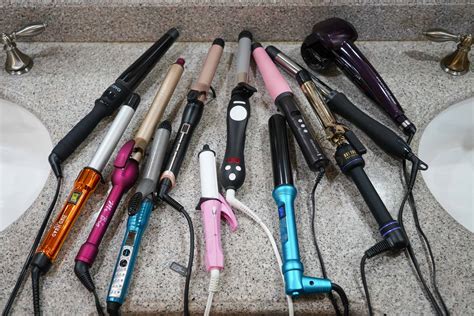Table of Contents
- Introduction
- Materials Used in Curling Irons
- Factors to Consider When Choosing a Curling Iron Material
- Comparison of Curling Iron Materials
- Step-by-Step Guide to Choosing the Best Curling Iron Material
- Pros and Cons of Different Curling Iron Materials
- Conclusion
Introduction
A curling iron is an essential tool for creating beautiful curls and waves in your hair. But with so many different materials available, choosing the best one for your needs can be a daunting task. In this article, we will discuss the different materials used in curling irons, the factors to consider when choosing a material, and provide a step-by-step guide to help you make the best decision for your hair.

Materials Used in Curling Irons
There are five main materials used in curling irons: ceramic, titanium, tourmaline, gold, and silver. Each material has its own unique properties that make it suitable for different hair types and styling needs.
Ceramic
Ceramic is a popular choice for curling irons because it heats evenly and distributes heat evenly throughout the barrel. This helps to prevent hot spots that can damage hair. Ceramic also releases negative ions, which help to reduce frizz and add shine to hair.
Titanium
Titanium is a lightweight and durable material that heats up quickly and evenly. It is also a good conductor of heat, which means that it can transfer heat directly to the hair. This makes titanium curling irons ideal for styling thick or coarse hair.
Tourmaline
Tourmaline is a semi-precious gemstone that releases negative ions when heated. These negative ions help to break down water molecules in the hair, which reduces frizz and adds shine. Tourmaline curling irons are also said to be gentle on hair and can help to prevent damage.
Gold
Gold is a luxurious material that is often used in high-end curling irons. It heats up evenly and is a good conductor of heat. Gold also has antibacterial properties, which can help to keep your curling iron clean and free of bacteria.
Silver
Silver is another luxurious material that is used in curling irons. It heats up quickly and evenly, and is also a good conductor of heat. Silver also has antibacterial properties and is said to be gentle on hair.
Factors to Consider When Choosing a Curling Iron Material
When choosing a curling iron material, there are several factors to consider, including:
- Hair type: Different hair types require different curling iron materials. For example, ceramic curling irons are ideal for fine or damaged hair, while titanium curling irons are better for thick or coarse hair.
- Styling needs: If you want to create tight curls, you will need a curling iron with a smaller barrel. If you want to create loose waves, you will need a curling iron with a larger barrel.
- Budget: Curling irons can range in price from $20 to $200. The price of a curling iron will depend on the material, the size, and the features.
Comparison of Curling Iron Materials
The following table compares the different curling iron materials:
| Material | Heat Distribution | Frizz Reduction | Durability | Price |
|---|---|---|---|---|
| Ceramic | Even | High | Moderate | Low |
| Titanium | High | Moderate | High | Medium |
| Tourmaline | Even | High | Moderate | High |
| Gold | Even | Moderate | High | High |
| Silver | Even | High | High | High |
Step-by-Step Guide to Choosing the Best Curling Iron Material
- Determine your hair type. What type of hair do you have? Fine, medium, or thick? Coarse or damaged? Knowing your hair type will help you narrow down your choices.
- Consider your styling needs. What type of curls or waves do you want to create? Tight curls, loose waves, or something in between? This will help you determine the size of the curling iron barrel you need.
- Set a budget. How much do you want to spend on a curling iron? Curling irons can range in price from $20 to $200.
- Research different curling iron materials. Read reviews and compare the different materials to find the one that is right for you.
- Make a decision. Once you have considered all of the factors, make a decision about the best curling iron material for you.
Pros and Cons of Different Curling Iron Materials
The following table outlines the pros and cons of different curling iron materials:
| Material | Pros | Cons |
|---|---|---|
| Ceramic | Heats evenly, distributes heat evenly, releases negative ions | Can be fragile, may not last as long as other materials |
| Titanium | Heats up quickly and evenly, durable, good conductor of heat | Can be more expensive, may damage hair if used too often |
| Tourmaline | Releases negative ions, gentle on hair, reduces frizz | Can be more expensive, may not last as long as other materials |
| Gold | Heats up evenly, durable, good conductor of heat, antibacterial | Can be expensive, may not be as effective as other materials for reducing frizz |
| Silver | Heats up quickly and evenly, durable, antibacterial, gentle on hair | Can be expensive, may not be as effective as other materials for reducing frizz |
Conclusion
Choosing the best curling iron material for you depends on your individual hair type and styling needs. By considering the factors discussed in this article, you can make an informed decision that will help you achieve the beautiful curls or waves you desire.
